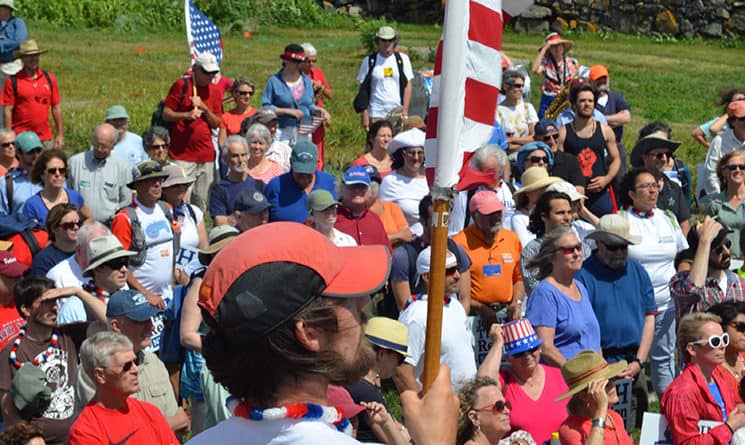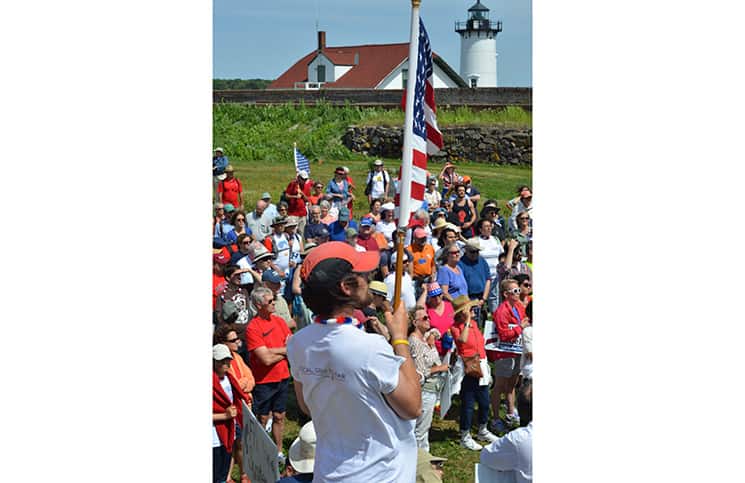Since January 2014, volunteers with the New Hampshire Rebellion (NHR) have been walking up and down and across the Granite State to draw attention to what executive director Daniel Weeks says is the biggest problem in politics: the corrupting influence of big money. Whether it’s from massive super PACS or billionaire donors, that money sways the course of elections and unduly influences politicians — and that’s left regular citizens, who don’t have millions or even thousands of dollars to contribute to campaigns, feeling like they don’t have a voice, according to Weeks. Along with walking, volunteers are bird-dogging presidential candidates and asking them NHR’s signature question: “What specific reforms will you advance to end the corrupting influence of money in politics?”
The group’s latest walk will take place here in the Seacoast on July 4, with walkers stepping off from Hampton and Rochester in the morning and converging in Portsmouth for a rally in Prescott Park that evening. The Sound spoke with Weeks about how the conversation about money in politics is shifting and how it’s influencing the 2016 presidential race.
Why hold a July 4 walk on the Seacoast?
Of course, the date is no coincidence, and nor is the place. On July 4, we celebrate our independence, and the Seacoast has a particular connection to our independence. In 1774, Paul Revere made his first ride in the cause of the revolution up to Portsmouth from Boston to warn of British troop movements. … And, in the immediate aftermath of July 4, 1776, the Declaration of Independence was carried to all corners of the colonies on horseback and read in public square for citizens to understand … and that’s what we intend to replicate with the closing rally, with a reading of the Declaration by Republicans and Democrats. … More broadly … it’s about the freedom from the corruption of big money in politics, which is why we’re taking to the streets on Saturday.
A year and a half in to the New Hampshire Rebellion, how do you think it’s changed the conversation about money in politics?
What we have seen in the last 18 months is an issue that has, for many years, been written off by most political observers as just tilting at windmills, become … a central part of the conversation in this presidential election. We have 500 volunteers that get weekly notifications of events and where candidates will be go out to ask the question. I think it’s the accumulation of hundreds of questions being posed to candidates around this issue … that is causing candidates to incorporate this message, this theme of corruption and big money and to reform the system, into their campaigns. We’ve seen leading candidates on both sides talk about it in a way we just haven’t seen before. And we’ve also seen the media in recent polls … reporting that this is a major issue. That’s not just due to our efforts, of course.
We’re seeing really unanimous agreement about the problem of money in politics on both sides of the aisle.
How are candidates talking about money in politics? And how are voters talking about it and holding them accountable?
We’re seeing really unanimous agreement about the problem of money in politics on both sides of the aisle. When voters go out to ask questions, they’re looking for solutions, or looking for at least the acknowledgement that we need to address this problem.
In terms of solutions, we’re starting to hear some serious solutions that candidates are giving — everything from a constitutional amendment to overturn Citizens United Supreme Court ruling (and leading candidates on both sides of the aisle are calling for that: Hillary Clinton as well as the other two announced Democratic candidates, as well as Republican Sen. Lindsey Graham, and others are expressing openness to that) to proposals for closing the revolving door of lobbyists and members of Congress from (former New York) governor George Pataki … I think that’s in response to pressure from citizens.
How soon will those solutions arrive? Will we have to wait until the 2016 campaigns are over to see progress?
There are some important proposals in Congress that will take us a long way to fixing this corrupt system: the Government by the People Act, from Congressman John Sarbanes … this would create a small donor system for funding elections … and a similar bill was recently introduced to the Senate by Sen. Dick Durbin. Realistically, I don’t see these passing this year. I think our sights are really set on the 2016 election, to ensure the nominees in both parties make this one of their top priorities and we elect a president and Congress committed to fixing the system as one of their first priorities.
How do you think the recent Supreme Court ruling, upholding Arizona’s redistricting commission, will help with money in politics?
I’m very encouraged by it. I think money in politics is the first, but not the only critical reform needed to make our democracy work. Redistricting is a critical companion reform in our view. We need to take it out of partisan hands so that we don’t have a situation where over 90 percent of Congressional districts are locked up for one party or another. … I think electoral competition is good … the key to voters having a real choice are elections that aren’t effectively owned by bilionaires … but also making sure the districts themselves are drawn in a fair manner. … And it’s worth noting that New Hampshire has not yet taken the step of moving beyond partisan districting and that’s something we really need to grapple with as a state ahead of next Census in 2020.
The New Hampshire Rebellion Independence Day walk takes place Saturday, July 4, with starting locations in Hampton and Rochester. The post-walk rally takes place in Prescott Park in Portsmouth at 5 p.m. For more information, visit walk.nhrebellion.org.


